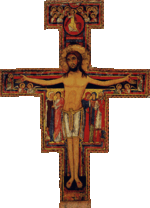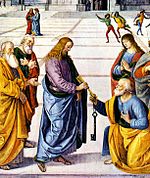- Pope Gregory XIV
-
Gregory XIV Papacy began 5 December 1590 Papacy ended 16 October 1591 (10 months, 11 days) Predecessor Urban VII Successor Innocent IX Orders Consecration 1564
by St. Charles BorromeoCreated Cardinal 12 December, 1583 Personal details Birth name Niccolò Sfondrati Born 11 February 1535
Somma Lombardo, Duchy of MilanDied 16 October 1591 (aged 56)
Rome, Papal StateOther Popes named Gregory Pope Gregory XIV (11 February 1535 – 16 October 1591), born Niccolò Sfondrati, was Pope from 5 December 1590 until his death in 1591.
Contents
Early career
Niccolò Sfondrati was born at Somma Lombardo, then part of the Duchy of Milan, in the highest stratum of Milanese society. His mother, of the house of Visconti, died in childbirth. His father Francesco, a senator of the ancient comune of Milan, was created Cardinal-Priest by Pope Paul III in 1544.
In his youth he was known for his modest lifestyle and stringent piety. He studied at Perugia and Padua, was ordained a priest and swiftly appointed Bishop of Cremona, in 1560, in time to participate in the sessions of the Council of Trent from 1561 to 1563. Pope Gregory XIII made him a Cardinal-Priest of Santa Cecilia in Trastevere on 12 December 1583. Sfondrati was a close follower of Carlo Cardinal Borromeo, and when cardinal he celebrated the Requiem Mass for Borromeo on 7 November 1584.[1] Sfondrati was an intimate friend and a great admirer of Philip Neri, an Italian priest who died in 1595 and was canonised in 1622.
After the death of Pope Urban VII on 27 September 1590, the Spanish ambassador Olivares presented the conclave a list of the seven cardinals who would be acceptable to his master Philip II of Spain. On 5 December 1590, after two months of deadlock, Sfondrati, one of Philip II's seven candidates but who had not aspired to the office, was elected pope. Alessandro Cardinal Montalto came to Sfondrati's cell to inform him that the Sacred College had agreed on his election and found him kneeling in prayer before a crucifix. On the next day he was elected Pope Gregory XIV he burst into tears and said to the cardinals: "God forgive you! What have you done?" In his bull of 21 March 1591, Cogit nos, he forbade under pain of excommunication all betting concerning the election of a Pope, the duration of a pontificate, or the creation of new cardinals.
Papacy
Papal styles of
Pope Gregory XIV
Reference style His Holiness Spoken style Your Holiness Religious style Holy Father Posthumous style None Gregory XIV's brief pontificate was marked by vigorous intervention in favour of the Catholic party in the French Wars of Religion. Instigated by the king of Spain and the duke of Mayenne, he excommunicated Henry IV of France on 1 March 1591, reiterating the 1585 declaration of Pope Sixtus V that as a heretic (Protestent) Henry of Navarre was ineligible to succeed to the throne of Catholic France and deprived of his dominions.
Gregory XIV levied an army for the invasion of France, and dispatched his nephew Ercole Sfondrati to France at its head. He also sent a monthly subsidy of 15,000 scudi to Paris to reinforce the Catholic League. By coming down solidly on the side of Spanish interests, in part because Gregory XIV was elected due to the influence of the Spanish cardinals, the recent papal policy of trying to maintain a balance between Spain and France was abandoned.
Gregory XIV created five Cardinals, among whom was his nephew Paolo Emilio Sfondrati, his Secretary of State. He attempted to convince Philip Neri, a long-time friend, to accept the post of Cardinal, but Neri refused, saying that there were many more deserving of the honour than him.
In a decree dated 18 April 1591 (Bulla Cum Sicuti), Gregory XIV ordered reparations to be made by Catholics in the Philippines to the natives, who had been forced into slavery by Europeans, and he commanded under pain of excommunication of the owners that all native slaves in the islands be set free.
Also in 1591, Gregory XIV modified the Apostolic Constitution Effraenatam of Pope Sixtus V (1588) so that the penalty for abortion did not apply until the foetus became animated.
The biographers mention that Pope Gregory XIV had a nervous tendency to laughter, which occasionally became irresistible and even manifested itself at his coronation. Gregory, who was in poor health before his election to the papacy, died due to a large gallstone and was succeeded by Innocent IX.
External links
 "Pope Gregory XIV" in the 1913 Catholic Encyclopedia.
"Pope Gregory XIV" in the 1913 Catholic Encyclopedia.- Biography on St. Michael's Call Papal Library
- Defending the Faith website: Gregory XIV
References
Catholic Church titles Preceded by
Urban VIIPope
1590–91Succeeded by
Innocent IXCatholic Church Organizations, Papacy, Teachings and Liturgical TraditionsHistory Jesus · Twelve Apostles · Early Christianity · History of the Papacy · Ecumenical Councils · Missions · Great Schism of East · Crusades · Great Schism of West · Protestant Reformation · Counter-Reformation · Catholic Church by country
Hierarchy Pope · Cardinals · Patriarchs · Major Archbishops · Primates · Metropolitans · Archbishops · Diocesan BishopsTheology Sacraments Mariology Doctors of
the ChurchAlbertus Magnus · Ambrose · Anselm of Canterbury · Anthony of Padua · Thomas Aquinas · Athanasius of Alexandria · Augustine of Hippo · Basil of Caesarea · Bede · Robert Bellarmine · Bernard of Clairvaux · Bonaventure · Petrus Canisius · Catherine of Siena · Peter Chrysologus · John Chrysostom · Cyril of Alexandria · Cyril of Jerusalem · Peter Damian · Ephrem the Syrian · Francis de Sales · Gregory of Nazianzus · Gregory the Great · Hilary of Poitiers · Isidore of Seville · Jerome · John of Damascus · John of the Cross · Lawrence of Brindisi · Leo the Great · Alphonsus Maria de Liguori · Teresa of Ávila · Thérèse of LisieuxPope Benedict XVI Preceding Popes Orders and
SocietiesVatican II Particular Churches
sorted by
Liturgical TraditionsAlexandrian · Coptic · Ethiopic · Antiochian · Maronite · Syriac · Syro-Malankara · Armenian · Armenian · Byzantine · Albanian · Belarusian · Bulgarian · Croatian · Greek · Hungarian · Italo-Albanian · Macedonian · Melkite · Romanian · Russian · Ruthenian · Slovak · Ukrainian · East Syrian · Chaldean · Syro-Malabar · Latin · Roman · Anglican Use · Sarum · Ambrosian · MozarabicHistory of the Catholic Church General History of the Catholic Church · History of the Papacy · History of the Roman Curia · Catholic Ecumenical Councils · Timeline of the Catholic Church · History of Christianity · Role of the Catholic Church in Western civilization · Art in Roman Catholicism · Catholic religious order · Christian monasticism · Papal States
Church beginnings Constantine the Great to
Pope Gregory IConstantine the Great and Christianity · Arianism · Basilica of St. John Lateran · First Council of Nicaea · Pope Sylvester I · First Council of Constantinople · Biblical canon · Jerome · Vulgate · First Council of Ephesus · Council of Chalcedon · Benedict of Nursia · Second Council of Constantinople · Pope Gregory I · Gregorian chant
Early Middle Ages Third Council of Constantinople · Saint Boniface · Byzantine Iconoclasm · Second Council of Nicaea · Charlemagne · Pope Leo III · Fourth Council of Constantinople · East–West Schism
High Middle Ages Pope Urban II · Investiture Controversy · Crusades · First Council of the Lateran · Second Council of the Lateran · Third Council of the Lateran · Pope Innocent III · Latin Empire · Francis of Assisi · Fourth Council of the Lateran · Inquisition · First Council of Lyon · Second Council of Lyon · Bernard of Clairvaux · Thomas Aquinas
Late Middle Ages Protestant Reformation/
Counter-ReformationBaroque Period to the
French Revolution19th century Pope Pius VII · Pope Pius IX · Dogma of the Immaculate Conception of the Virgin Mary · Our Lady of La Salette · Our Lady of Lourdes · First Vatican Council · Papal infallibility · Pope Leo XIII · Mary of the Divine Heart · Prayer of Consecration to the Sacred Heart · Rerum Novarum
20th century Pope Pius X · Our Lady of Fátima · Persecutions of the Catholic Church and Pius XII · Pope Pius XII · Pope Pius XII Consecration to the Immaculate Heart of Mary · Dogma of the Assumption of the Virgin Mary · Pope John XXIII · Second Vatican Council · Pope Paul VI · Pope John Paul I · Pope John Paul II
21st century By country or region Brazil · Cuba · France · Germany · Hispano-America · Ireland · Japan · Mexico · Spain · United States · Venezuela
Categories:- Popes
- Italian popes
- University of Perugia alumni
- Participants in the Council of Trent
- People from the Province of Varese
- 1535 births
- 1591 deaths
- 16th-century Italian people
Wikimedia Foundation. 2010.


